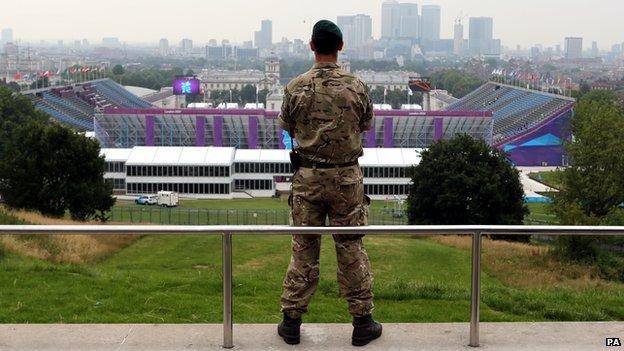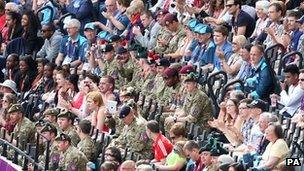London Olympics: How was it for the troops?
- Published

A soldier overlooks the Greenwich Park equestrian venue
The military has played a key part in the Games, and their numbers were stepped up at the last minute. How have they found their Olympic experience?
Clearly they have techniques for this, members of the armed forces, for not becoming engaged in conversation on topics they're not allowed to discuss.
Ask them how they have found their job guarding the Games and they bounce the questions straight back: "No, but how have you found your experience? Are your working conditions all right?"
They've faced tougher situations than a journalist on Olympic Park bothering them with queries and learned how to deal with it.
Armed forces make up 50% of the security manpower at these Games and depending on which access gate people enter the Olympic Park or venues through, they are the ones scanning bags, emptying water bottles and seeing people through the metal-detector.
Temporary camps
Geordies, Scots and south-western Englanders' voices greet the staff and public coming on to the sites.
They are some of 18,200 Army, Navy and Royal Air Force personnel across the Games operation who were assigned to the task, volunteered for the job months ago or were drafted in at a couple of days' notice to fill a gap in guard numbers left between Games organisers Locog and private security firm G4S.
Troops are living in three temporary camps set up at sites near the Olympic Park.
During the Games, Lord Coe and General Sir David Richards, the Chief of the Defence Staff, went to one, the country park in Hainault which has been turned into accommodation for more than 3,500 members of the armed services involved in the Games.
"For me it really has been one of the defining features of our Games," Lord Coe said of the military's contribution. It is a contribution which ended up being much larger and more visible than planned.
The military was always going to be involved - providing high-end specialist capabilities like flying RAF Typhoons and Lynx Helicopters or being on stand-by as bomb disposal teams - most of these capabilities have barely been used.
There was originally some reluctance when discussions took place about the military providing personnel for the Games. The armed services were at full stretch with operations in Afghanistan while Games organisers were nervous of the appearance of over-militarising the competition.
Locog first asked for more troops in December when they realised they had massively underestimated the numbers needed for security. Then, with only a few weeks to go, they realised they needed more.
A vast logistical operation had to be ramped up quickly - not least finding places for the troops to stay (portable toilets had to be shipped over from Ireland for those staying at Tobacco Dock, a disused shopping centre where conditions have been criticised in the press).
Senior military figures made clear that if they were going to be asked to do more then they wanted to take more control and responsibility over what they did and what they did not do. Functions such as acting as stewards were agreed not to be suitable.
The military also put in more of its people to help manage security at each of the venues and provide more control sitting alongside the civilian staff. Relations with G4S staff were generally good although varied from venue to venue.
All at a time when some of those members of the armed forces at the Olympics were staffed from units due to be cut.
Although senior officers maintain they would still be able to provide this kind of last minute call-up after the upcoming reductions.
So how do they feel about being at the Olympics? The picture when they decide to speak privately is as varied as through any group.

Soldiers fill seats in the Olympic Stadium on the first morning of the athletics
It depends on how much notice they had, what they were doing before, their rank, their nature, if they lost leave, if they have left children on summer holidays behind.
Young squaddies with a driving job in the west of England would like to get home. Troops back from a tour of Afghanistan think at least they're not being mortared. Others are bored by a task that doesn't stretch their skills.
If they are in the accommodation that was constructed as part of the long term plan, it's got a gym, good food and hot showers - better than a bunk in an underground car park area or former shop.
Some of those camped at Hainault did feel more part of the Games than others. Those doing security at the venues had stories of meeting athletes and forces have even been called on to fill empty seats at venues.
Those working on support functions - such as driving, cooking, communication and logistics - were one level removed, hoping but not always getting tickets through a ballot and largely watching events unfold on TV in the large welfare areas.
Man-in-uniform factor
Military personnel will be reimbursed any leave lost but receive no additional financial bonus.
At Hainault, Sir David Richards welcomed the opportunity the Games had afforded. "It is what you have armed forces for," added Sir David. "It is not only going off to fight the nation's wars. It has been a great opportunity for us to join in in much greater numbers."
Officers will tell you soldiers do moan. But at the end of the day, they're the Army. They do tough jobs in hard circumstances. The Olympics isn't the worst, and they are bright and breezy every day on the gates.
This has been a high-profile deployment for the military after a decade in which the public has mainly seen them engaged in combat in far-away countries. One legacy of the Games may well be a greater level of comfort on both sides with the armed forces reintroduced into domestic life but still in uniform.
And the public love them, their efficiency, friendly nature and some of the women coming into the Park often admit there is that man-in-uniform factor.
"I was very happy to see the soldiers," says Liz Gluckman, arriving with her family from Cobham. "They were very friendly and smiling."
"And they were efficient," adds her husband Ray, with some speed. "We came to a test event here last year and it was very slow. But today we just went through in one minute, if that."